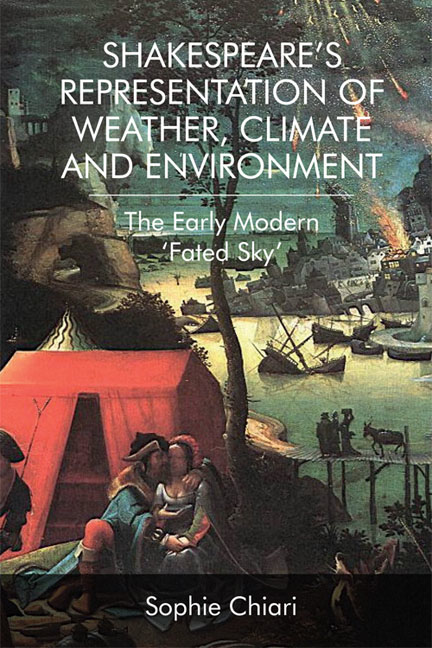Book contents
- Frontmatter
- Contents
- Illustrations
- Acknowledgements
- Textual Note
- Introduction
- 1 ‘We see / The seasons alter’: Climate Change in A Midsummer Night's Dream
- 2 ‘[T]he fire is grown too hot!’: Romeo and Juliet and the Dog Days
- 3 ‘Winter and rough weather’: Arden's Sterile Climate
- 4 Othello: Shakespeare's À bout de souffle
- 5 ‘The pelting of [a] pitiless storm’: Thunder and Lightning in King Lear
- 6 Clime and Slime in Anthony and Cleopatra
- 7 The I/Eye of the Storm: Prospero's Tempest
- Conclusion: ‘Under heaven's eye’
- Bibliography
- Index
3 - ‘Winter and rough weather’: Arden's Sterile Climate
- Frontmatter
- Contents
- Illustrations
- Acknowledgements
- Textual Note
- Introduction
- 1 ‘We see / The seasons alter’: Climate Change in A Midsummer Night's Dream
- 2 ‘[T]he fire is grown too hot!’: Romeo and Juliet and the Dog Days
- 3 ‘Winter and rough weather’: Arden's Sterile Climate
- 4 Othello: Shakespeare's À bout de souffle
- 5 ‘The pelting of [a] pitiless storm’: Thunder and Lightning in King Lear
- 6 Clime and Slime in Anthony and Cleopatra
- 7 The I/Eye of the Storm: Prospero's Tempest
- Conclusion: ‘Under heaven's eye’
- Bibliography
- Index
Summary
When the ennui of winter's sterility gleamed.
Where Romeo and Juliet showed an urban milieu peopled by heatstricken characters, As You Like It turns to a more rural and windy environment. As in Stéphane Mallarmé's ‘The Swan’, As You Like It is a comedy where Shakespeare somewhat perversely transforms the locus amoenus of Arden's green locale into a wasteland of ice and idleness, thus making ‘the boredom of sterile winter’ sound really ‘resplendent’. All the same, the forest paradoxically provides its natives and refugees alike with a breathing space that promotes selfdiscovery and self-knowledge. It is a sacred place, a natural ‘temple’ (‘for here we have no temple but the woods,’ Touchstone says to Audrey in 3.3.44–5), with its columns of carved trees where lovers and exiles, fools and philosophers come to pause and meditate. Interestingly, the word ‘temple’ is derived from the Latin templum, a term itself probably related to the word tempus referring to both time and season. As a matter of fact, the words for weather phenomena were originally the same as those used to designate time and, in a bucolic Arden owing much to the pastoral poetry of Virgil, this triple association between time, weather and the sacred sounds natural enough.
As already stated above, the rather unpredictable nature of the English climate was a real issue for Shakespeare's contemporaries, so much so that the need to allay the fears of meteorological uncertainties encouraged people to rely on the forecasts of popular almanacs. In As You Like It, almost everybody seems obsessed with the weather, and if the fool is said to ‘bask […] in the sun’ (2.7.15), Amiens's two songs (2.5.1–8 and 2.7.174–97) rather point to a bad weather spell afflicting the pastoral world. Both airs are tinged with pessimistic undertones that reflect the difficulties of the Ardenites and their constant efforts to cope with the situation. In his first song, Amiens notices that, in the forest, one ‘shall see / No enemy / But winter and rough weather’ (2.5.5–7). Depressing enough in itself, this burden actually delights the melancholy Jaques and is repeated later on in the scene (2.5.35–8) by all the characters onstage.
- Type
- Chapter
- Information
- Shakespeare's Representation of Weather, Climate and EnvironmentThe Early Modern ‘Fated Sky’, pp. 80 - 110Publisher: Edinburgh University PressPrint publication year: 2017

